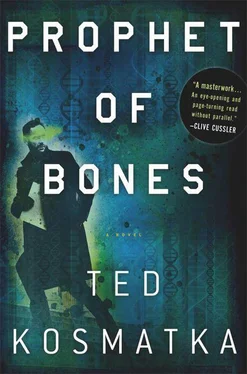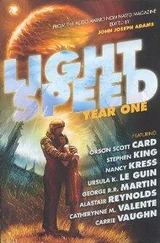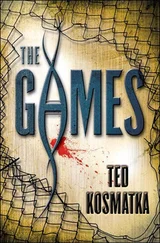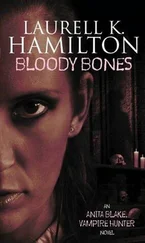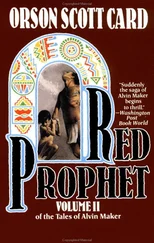The man caught his stare. He smiled. “I’m Dr. Harcoff. How are you feeling?”
“I don’t know.” It was an honest answer. What Paul felt was disconnected.
The doctor nodded like he understood. His stethoscope was silver. He wore a silver watch. “Your body has suffered a major insult,” Dr. Harcoff said. “But in addition to the physical trauma, the loss of an eye can be an enormous psychological blow. We have counselors who can help if you feel you need it.”
“No,” Paul said. “I’m fine.” He was alive, after all. James wasn’t.
The doctor’s brow furrowed. He scribbled something on the chart.
“An ocularist will fit you with a more permanent prosthetic in six to eight weeks. Right now you have something temporary.”
“Why do I have to wait so long?”
“There’s a window of best opportunity. If we tried to fit you with an artificial eye before that, there won’t be enough healing. If we wait too long after that, then the socket can atrophy and it’s hard to get a good functional result.”
“Functional?”
“Your existing eye muscles will be attached to a new motility implant and you should get near-normal eye movement. That’s important from an aesthetic perspective. Right now you have a silicone conformer in place to retain orbit volume.”
“It’s in there now?”
“Yes.”
Paul nodded. The doctor moved closer. He placed the clipboard on the bed and opened the bandages around the wound. He studied it for a moment, then closed the bandages again.
“It looks like there will be some exterior scarring from the initial traumatic injury, but the wound has clean edges, and the stitches are good. Eye shape differs widely among individuals and you’re fortunate; to be perfectly blunt with you, ocular prosthetics often seem less noticeable in people with epicanthic folds. For patients with prominent eyes, it’s sometimes a challenge to reproduce a natural appearance.” He paused and regarded Paul closely. “You’ll have a diagonal scar across your eyelid, but the artificial eye itself shouldn’t be noticeable at all. We’ll be able to match your eye color exactly, and by the time we’re done, the only difference between your new eye and your old one is that you won’t be able to see out of it. Do you wear glasses?”
“No.”
“How is the vision in your good eye?”
“Good.”
The doctor nodded. “As for the silicone conformer currently in place, you just need to be careful when you wipe your eyes for the next few weeks. Most people opt to wear dark glasses or an eye patch until the conformer is replaced by a full prosthetic. The conformer doesn’t simulate a natural appearance.”
“When can I leave?”
“We’re going to keep you a little longer for observation and to watch for infection. I should be able to let you know tomorrow. Do you have any other questions?”
Paul shook his head.
“Good. I can recommend a plastic surgeon later to deal with soft-tissue scarring.”
“No, no plastic surgery. Scars don’t bother me.”
The doctor nodded and left. When he was gone, Paul stood and walked into the bathroom, pulling the IV pole behind him. He stood in front of the mirror. Being careful to keep his injured eye closed, he lifted the bandage to survey the damage.
He stared at himself.
His eye was fucked, he decided.
The scar neatly bisected his closed eyelid, crossing at a slight angle to the vertical and extending up to put a notch in the bottom of his eyebrow. It occurred to him how close he’d come to dying. If the knife had just gone a little deeper…
Then he opened the ruined eye. He stared at himself.
One eye was dark and piercing—like his mother’s eyes. The other was a smoky white, the eye of a ghost.
The eye of the dead.
* * *
They kept him in the hospital for two more days. Time enough to hit bottom. Time enough to think about where things went wrong.
Mr. Lyons came to visit him on the second day. “We’re so sorry about what happened, Paul. This was a tragedy.”
And then other people from the lab.
“You gave us quite a scare.”
“We’re glad to have you back.”
“The doctors are gonna have you up in no time.”
And Hongbin, his coworker from the lab, ever the clown. “Someday they’ll come up with a bionic eye,” he said. He leaned close and whispered, “Then you’ll have the advantage.”
Later that evening, Mr. Lyons returned, a lawyer with him this time. Another suit. Hands were shaken, introductions made. “You don’t need to worry about the bills,” the man said. “The company is going to pick up everything.”
Paul sensed that they expected a response. “Thank you,” he said.
Mr. Lyons looked different.
Paul noticed it right away.
His face was different, all business this time. So this was it, then. The debriefing. Paul had been waiting for it. The two men sat. It was very formal. They asked their questions.
“Could you describe what happened, in your own words?”
So Paul told the story. Told it just how it was, just how it went down. Talked about the dig, and the bones, and the soldiers, and the river. He talked about the hotel room and the darkness. He talked about the throat like a crushed aluminum can, and only then did Mr. Lyons’s face change again. A new look in his eyes, business falling away.
And then the corporate lawyer said it. The thing he shouldn’t have. The thing that jangled, that told its own story.
“Did you get the samples?”
Paul stared at him. Bore into him with his one good eye.
The question had something pressing in from behind it, and Paul knew suddenly that their whole conversation had merely been foreplay. It had just been a prelude to this moment.
“No,” he said. “No, they took everything.”
The men nodded, as if pleased with his answer. They shook his hand again.
“I look forward to seeing you back at work,” Mr. Lyons said. “And again, we’re very sorry about what happened. Nobody should have to go through that.” The men left.
Later that night, the doctor came in to check on him one last time. He made a short examination, then signed the discharge papers. An hour later, two nurses were wheeling him to the front of the building—“standard procedure,” they insisted when he said he could walk. A cab sat idling for him at the hospital’s entrance. He gave his apartment address to the man in the front seat.
And then the hospital rolled past.
Paul rested his face against the cool glass.
A bridge. Water. Baltimore, and a brick apartment block. The car came to a stop in front of his building. He paid the cabbie and took the stairs, two flights.
As he climbed, his eye started throbbing. No, not his eye, he told himself. The place where his eye had been. Like this, the place where his life had been.
The conformer felt heavy, alien, not a part of him. His head felt light, and he stopped at the top of the stairs, willing himself not to faint. He wondered about phantom limb syndrome; soldiers who’d lost an arm or a leg would sometimes swear they could still feel it, swear they could wiggle their toes. He wondered if that applied to eyes, too. Would he swear he could see something that wasn’t really there? What would he see with his ghost eye?
Paul opened his front door and stepped inside. He put his keys on the hook near the door. Next he went to the kitchen and filled a big cup of water, and then he watered his plants, which were quite obviously dead. He hadn’t had time to water them the first night he’d been back. That first night, when he still hadn’t gone to the hospital yet.
When he’d come home first, after the airport.
His neighbor had seen the eye patch that night, and she’d been horrified. “What happened?” she’d asked.
Читать дальше
